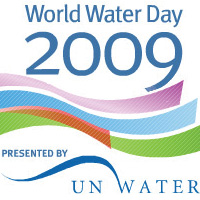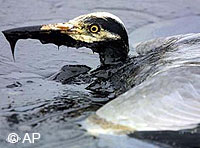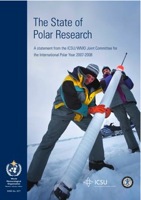
News |
- Accountants Seek Sustainability
- Global Warming Risk Underestimated
- World Water Day - March 22
- New Environmental Enforcement Act
- Illegal Ivory Trade - Asian Elephants Threatened
- Polar Global Warming Speeds Up
- Canadians Rate Environment a Priority
- 2008 Manitoba Protected Areas Audit Released
- Navigable Waters Act - Canadians Needed
- Ontario Endangered Species Act: Review
- Soft Drinks Contain Bisphenol A
- Protest for Climate in Washington
| Accountants Seek Sustainability | 26 March 09 |
 A new sustainability accounting framework provides professional accountants the tools to incorporate environmental impacts into business operations and help with the complications of accounting for carbon. A new sustainability accounting framework provides professional accountants the tools to incorporate environmental impacts into business operations and help with the complications of accounting for carbon.The International Federation of Accounting (IFAC), a global organization for the accounting profession, has launched a Sustainability Framework. The IFAC provides a set of web-based tools that allows users to navigate sustainability issues, examples of good practice, and links to additional information. The IFAC sustainability framework outlines four overall perspectives to successfully implement environmental policy: business strategy, internal management, financial investors, and other stakeholders to increase transparency and accountability. The launch of the IFAC on line tools coincides with the Low Carbon Summit, a forum for businesses to work with government on finding ways to jump-start the economy while addressing climate change. View IFAC Sustainability FrameworkView March 17, 2009 Climate Biz article View February 6, 2009 IFAC press release Sources: IFAC, Climate Biz, Accountancy Age |
|
 Print version Print version |
Top |
| Global Warming Risk Underestimated | 26 March 09 |
 Lord Stern, former World Bank chief economist, has said the economic impact of global warming has been massively underestimated. At a recent conference in Copenhagen, Lord Stern urged scientists speak up about the disastrous consequences to climate change. Lord Stern, former World Bank chief economist, has said the economic impact of global warming has been massively underestimated. At a recent conference in Copenhagen, Lord Stern urged scientists speak up about the disastrous consequences to climate change.In 2006, Lord Stern produced an influential document on global warming, "Stern Review on the Economics of Climate Change". The report assumed that if nothing was done to counter climate change, global temperatures would rise between 2C and 3C by the end of the century and would cost about 20 percent of the GDP. Lord Stern says now new research shows temperatures could raise by 4C to 7C by 2100 and would produce conditions not seen on Earth for more than 30 million years. The revised estimated costs would be 50 percent higher than predicted in 2006 - risking a third of the world's wealth. Lord Stern warned, "The costs of delay are very deep." Climate change will cause sea levels to rise by 50 meters, increase occurrence of hurricanes and cause widespread desertification. Hundreds of millions of people would be forced to relocate and social conflict would follow. View March 13, 2009 Independent articleView March 12, 2009 Telegraph article View March 12, 2009 Associated Free Press article View website of Professor Lord Stern of Brentford, London School of Economics and Political Science View November 14, 2006 Manitoba Wildlands news item Sources: The Independent, Telegraph, Associated Free Press, London School of Economics and Political Science, Manitoba Wildlands |
|
 Print version Print version |
Top |
| World Water Day - March 22 | 16 March 09 |
 Celebrate World Water Day on March 22! This internationally recognized day encourages public awareness of freshwater resources and the importance of sustainable management. The theme this year focuses on our shared responsibility for managing transboundary lakes and river basins. Celebrate World Water Day on March 22! This internationally recognized day encourages public awareness of freshwater resources and the importance of sustainable management. The theme this year focuses on our shared responsibility for managing transboundary lakes and river basins.This year, Canada will celebrate World Water Day with a toast to public water. The Polaris Institute 'Inside the Bottle' campaign is urging Canadians to celebrate our municipal tap water by choosing to drink public water over purchasing bottled water. The Council of Canadians is also organizing activities across Canada by launching "The Blue Communities Project". This initiative provides community leaders and activists tools to promote water as a human right and ban bottled water in public spaces. Bottled water undermines the public water system, costs more, is less regulated, and consumes more energy than tap water. Visit the links below to sign up and pledge to support publicly-owned and delivered water. View United Nations World Water Day 2009View Inside the Bottle - World Water Day 2009 View Council of Canadians - Tap Water Pledge View Council of Canadians - Paint the Town Blue on World Water Day View March 5, 2009 Timmins Daily Press Sources: United Nations, Inside the Bottle, Council of Canadians, Daily Press |
|
 Print version Print version |
Top |
| New Environmental Enforcement Act | 16 March 09 |
 The Canadian federal government has introduced a new environmental enforcement bill to crack down on polluters by increasing maximum fines and listing offenders on a public registry. Polluting corporations would also be forced to inform shareholders of their environmental record. The Canadian federal government has introduced a new environmental enforcement bill to crack down on polluters by increasing maximum fines and listing offenders on a public registry. Polluting corporations would also be forced to inform shareholders of their environmental record.The legislation would amend nine existing laws - some which have not been updated in over twenty years. Maximum fines would be raised as high as $6 million for large corporations and $1 million for individuals who commit serious offences. The government has spent $21 million to boost its enforcement capacity and have hired over 100 new enforcement officers across the country. Stephen Hazell, an environmentalist who heads the Sierra Club of Canada, says the Conservative government deserves praise for a commitment to enforcement. Enforcement officers would be given more power to investigate cases and all fines would go to the Environmental Damages Fund, which provides funding to local environmental improvement initiatives. View March 4, 2009 Environment Canada press releaseView Environment Canada's Backgrounder: Overview of the Environmental Enforcement Bill View March 5, 2009 Globe and Mail article View March 4, 2009 Toronto Star article Sources: Environment Canada, Globe and Mail, Canadian Press |
|
 Print version Print version |
Top |
| Illegal Ivory Trade - Asian Elephants Threatened | 16 March 09 |
 Demand for ivory is driving illegal trading and threatening survival of Asia's remaining elephants. A recent report from TRAFFIC, the wildlife trade monitoring network, assessed the ivory trade in Viet Nam and found tusks selling for up to USD $1,500 per kilogram. Demand for ivory is driving illegal trading and threatening survival of Asia's remaining elephants. A recent report from TRAFFIC, the wildlife trade monitoring network, assessed the ivory trade in Viet Nam and found tusks selling for up to USD $1,500 per kilogram.Asian elephants are endangered due to habitat loss and poaching; between 30,000 and 50,000 remain in 13 Asian countries. "This insidious illegal trade is further threatening the highly endangered elephants of Asia and must be stopped," said Dr. Susan Lieberman, Director of the Species Programme for WWF-International. The report recommends that Viet Nam comply with its obligations under CITES (the Convention on International Trade in Endangered Species of Wild Fauna and Flora), prosecute offenders and destroy all ivory for sale in retail outlets. View February 16, 2009 IUCN press releaseView March 9, 2009 TRAFFIC article View WWF report, An Assessment of the Illegal Ivory Trade in Viet Nam (PDF) View February 16, 2009 WWF article View February 16, 2009 Reuters article View WWF Asian Elephants webpage Sources: ICUN, TRAFFIC, WWF, Reuters |
|
 Print version Print version |
Top |
| Polar Global Warming Speeds Up | 16 March 09 |
 New evidence of widespread effects of global climate change in the Polar Regions has been released from the International Polar Year (IPY) 2007 - 2008, a joint initiative of the World Meteorological Organization and the International Council for Science. New evidence of widespread effects of global climate change in the Polar Regions has been released from the International Polar Year (IPY) 2007 - 2008, a joint initiative of the World Meteorological Organization and the International Council for Science. The preliminary findings of over 160 research and outreach projects of the IPY are outlined in the State of Polar Research report. The summary confirmed the Arctic and Antarctic regions are warming faster than previously thought, sea levels are rising due to melting ice sheets, and extent of year-round sea ice decreased to its lowest known levels. "The International Polar Year 2007 - 2008 comes at a crossroads for the planet's future," said Michel Jarraud, secretary-general of the WMO. "The new evidence resulting from polar research will strengthen the scientific basis on which we build future actions." IPY has enhanced observational capacity, aided the understanding of pollutant transport, species' evolution and storm formation. Research also focused on social implications for Arctic peoples, food security and health. View International Polar Year event, Geneva, 24-25 February 2009View International Polar Year report, The State of Polar Research (PDF) View February 25, 2009 International Polar Year release (PDF) View February 25, 2009 Reuters article View February 26, 2009 Climate-L.org release View February 25, 2009 BBC article Sources: International Polar Year Website, Reuters, Climate-L.org, BBC |
|
 Print version Print version |
Top |
| Canadians Rate Environment a Priority | 12 March 09 |
 The economic downturn has not hampered Canadian's concern for climate change and the environment. A new poll from Ipsos-Reid shows that three-quarters of Canadians want Ottawa to adopt stimulus measures that are environmentally sustainable. The economic downturn has not hampered Canadian's concern for climate change and the environment. A new poll from Ipsos-Reid shows that three-quarters of Canadians want Ottawa to adopt stimulus measures that are environmentally sustainable. In the national poll 43 percent of Canadians think action on climate change must wait until after the recession but an encouraging 57 percent still think climate change must come first, even if it means higher deficits for Canada. "They're saying maybe we can have the best of both worlds," said Sean Simpson, research manager at Ipsos Reid. "Maybe instead of creating jobs in the tar sands we can create them in the environmental sector." A surprising 64 percent of Canadians say the oilsands development in Alberta should be halted until a clean method can be found, as do 47 percent of Albertans. View March 2, 2009 Ipsos Reid News Centre releaseView February 27, 2009 Globe and Mail article View March 2, 2009 Harris Decima article (PDF) View February 28, 2009 It's Getting Hot In Here Blog item View Harris Decima's New Environmentalism section Sources: Ipsos News Centre, Globe and Mail, Harris Decima |
|
 Print version Print version |
Top |
| 2008 Manitoba Protected Areas Audit Released | 11 March 09 |
 Manitoba failed to establish any new protected areas in 2008. In fact, 2008 represents the second consecutive year Manitoba actually failed to establish any protected lands in parks, ecological reserves, or other designations. These are the main findings of the Manitoba Wildlands 2008 Protected Areas Audit, covering all of 2008 through February 2009. Manitoba failed to establish any new protected areas in 2008. In fact, 2008 represents the second consecutive year Manitoba actually failed to establish any protected lands in parks, ecological reserves, or other designations. These are the main findings of the Manitoba Wildlands 2008 Protected Areas Audit, covering all of 2008 through February 2009.The annual Protected Areas Audit is based on publicly available government data and is an annual statistical analysis of protected lands in Manitoba. A 'protected area' refers to lands formally protected from development (hydroelectric, mining, forestry, roads, and any other activity that would cause significant alteration of habitat) through Manitoba regulations or formal agreement for private lands. Gaile Whelan Enns, Manitoba Wildlands director, expressed disappointment about the loss of protected lands and the lack of government progress in relation to its work plan "When lands are removed from protected status - regardless of the reason - the government has a social and political responsibility to compensate by establishing protection elsewhere. Government has laid out plans that commit it to consultations and technical work that precede legal protection and it is just not following through." View the complete Manitoba Wildlands 2008 Protected Areas Audit (PDF)Elements: View Manitoba Wildlands' 2008 Protected Areas Audit - Summary page (PDF) View Manitoba Wildlands' 2008 Protected Areas Audit/Grade - Map (PDF) View Manitoba Wildlands' 2008 Protected Areas Audit - Action List (PDF) View Manitoba Wildlands' 2008 Protected Areas Audit - Chart (PDF) Visit Manitoba Wildlands' Protected Areas Initiative page Visit Manitoba Wildlands' Protected Areas Announcements page Source: Manitoba Wildlands |
|
 Print version Print version |
Top |
| Navigable Waters Act - Canadians Needed | 10 March 09 |
 The Government of Canada is making amendments to important federal legislation governing the protection of, and right of access to, Canada's waterways. The Government of Canada is making amendments to important federal legislation governing the protection of, and right of access to, Canada's waterways.The Budget Implementation Act, an omnibus bill tabled February 6, 2009 proposes to radically change the law that protects the navigability of Canada's rivers and streams. The amendments are intended to limit applicability of the Navigable Waters Protection Act (NWPA) and, hasten the approval process for projects that might interfere with navigation. Proposed amendments to the Navigable Waters Protection Act seek to withdraw federal protection for thousands of lakes, rivers or streams across the country, meaning new projects such as bridges or dams could take place on those waterways without an environmental assessment or public notification. "The NWPA and navigation rights are integral part of Canada's environmental protection regime. If you take away the protection of navigation rights, you will impact the natural environment on Canadian waterways," said Will Amos of Ecojustice. "This is not a wise thing to do, even in tough economic times." View David Suzuki Foundation Take Action page on NWPAView February 9, 2009 Ecojustice Memorandum on NWPA (PDF) View Lake Ontario Waterkeepers NWPA Research (PDF) View Lake Ontario Waterkeepers comparison of old and new NWPA legislation (PDF) View Facebook advocacy group, I Speak For Rivers Sources: David Suzuki Foundation, Ecojustice |
|
 Print version Print version |
Top |
| Ontario Endangered Species Act: Review | 10 March 09 |
 Ontario Environmental Commissioner, Gord Miller says the province must strengthen its Endangered Species Act in order to protect the 183 species at risk. The effectiveness of the Act could be "seriously undermined if the government does not exercise significant restraint and caution." Ontario Environmental Commissioner, Gord Miller says the province must strengthen its Endangered Species Act in order to protect the 183 species at risk. The effectiveness of the Act could be "seriously undermined if the government does not exercise significant restraint and caution."In Miller's report entitled The Last Line of Defence: A Review of Ontario's New Protections for Species at Risk, he highlights his concerns over the Act's loopholes that allow the destruction of habitat, with little public input. "The public is (being) denied the right to open, transparent and accountable government decision-making related to these approvals - approvals that harm the species at risk," Mr. Miller said. The Ministry of Natural Resources has the power override to protections in the Act and Miller is calling on the government to publicize proposals for development that could affect species at risk. He also suggests monitoring the province's biodiversity to help species before they reach at-risk status. View Ontario Environmental Commissioner report, The Last Line of Defence: A Review of Ontario's New Protections for Species at Risk (PDF)View March 2, 2009 Ontario Environmental Commissioner press release View March 2, 2009 Globe and Mail article View March 3, 2009 Toronto Star article View March 3, 2009 Globe and Mail article Sources: Environmental Commissioner of Ontario, Globe and Mail, Toronto Star |
|
 Print version Print version |
Top |
| Soft Drinks Contain Bisphenol A | 10 March 09 |
 Recently banned from baby bottles, Health Canada scientists have found Bisphenol A or BPA, an estrogen-mimicking chemical, in soft drinks. Out of 72 drinks tested, 69 were found to contain BPA at levels below regulatory limits. Recently banned from baby bottles, Health Canada scientists have found Bisphenol A or BPA, an estrogen-mimicking chemical, in soft drinks. Out of 72 drinks tested, 69 were found to contain BPA at levels below regulatory limits.Scientific studies have indicated that even at very low doses, BPA can increase breast and ovarian cancer growth and the growth of some prostate cancer cells in animals. Health Canada has posted the data on its website but down play their findings. The soft drink industry has told consumers their canned products don't expose drinkers to BPA. BPA leaches into drinks from the lining of pop cans, which prevent soft drinks from coming into contact with metal. The highest concentration of BPA detected in a single serving of pop was 4.5 parts per billion. BPA was detected in energy drinks, ginger ales, diet colas, root beers and citrus-flavored sodas. View Health Canada, Survey of Bisphenol A in Canned Drink Products (PDF)View March 4, 2009 Globe and Mail article View March 6, 2009 CBC article View March 5, 2009 CTV article View April 23, 2008 Manitoba Wildlands article Sources: Health Canada, Globe and Mail, CBC, CTV, Manitoba Wildlands |
|
 Print version Print version |
Top |
| Protest for Climate in Washington | 06 March 09 |
 Thousands of activists blockaded the United States Capitol's coal fired power plant in a mass protest for climate March 2, 2009. The Capitol Power Plant, owned by Congress, has become a symbol of the impact of 'dirty' coal power in the US. Thousands of activists blockaded the United States Capitol's coal fired power plant in a mass protest for climate March 2, 2009. The Capitol Power Plant, owned by Congress, has become a symbol of the impact of 'dirty' coal power in the US.Canadian environmentalist Tzeporah Berman joined the protest and called on President Obama to act strongly to reducing greenhouse gases. Canada will soon face "hard caps" and have to address emissions from oilsands as the President and Congressional leaders promise aggressive carbon reductions. "We have to seize the momentum Obama is creating and remind him today that so many people across the continent want him to take bold action. I hate to write off my own country, but Canada is stuck in the past and is going to get a big wake up call from this new US administration," said Tzeporah Berman, executive director of PowerUP Canada. The Intergovernmental Panel on Climate Change cautioned that Canada will have to reduce global warming pollution by 25 to 40 percent below 1990 levels by 2020 to avoid catastrophic climate change. Visit Capitol Climate Action - Unprecedented ProtestView March 2, 2009 CNW article View March 2, 2009 Associated Press article View March 2, 2009 Environmental News Service article View Photo coverage of the protest View February 27, 2009 Guardian article View February 18, 2009 New York Times Dot Earth Blog entry Sources: Capitol Climate Action, CNW, Associated Press, Environmental News Service |
|
 Print version Print version |
Top |


 RSS Feeds:
RSS Feeds: